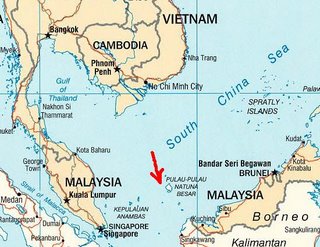This post was cross-posted by permission from The Security Scholar and is republished with permission. It may be read in its original form here.
By Natalie Sambhi
Brad Nelson has a neat overview in the Jakarta Globe earlier this month of Indonesia’s strategic options vis-à-vis China and the U.S. Enabled by what he calls ‘strategic flexibility’ (which I think is actually an extension of Indonesia’s so-called ‘dynamic equilibrium’ approach), Indonesia can stay neutral, pick China or the U.S., be a mediator/conduit or play the big kids off against one another.

Nelson rightly identifies Indonesia as attempting to pursue a ‘conduit’-type role. In fact, to be an effective conduit and exert real influence on the U.S. and China, Nelson prescribes Indonesia build goodwill as a conflict mediator and regional problem-solver.
In theory, it’s a sensible option but I have my misgivings about how it’s presented in relatively unproblematic terms. I say this because I’m reminded of comments made at a recent workshop by a participant challenging Indonesia’s image as a neutral party in South China Sea disputes. They asked, how could Indonesia be a legitimate mediator if it refuses mediation itself on issues such as the Natuna Islands?
Not being an expert on Indonesia’s territorial disputes, I dug up some of I Made Andi Arsana’s writing to work out how much of an issue Natuna is. Arsana’s overview of the history around the Natuna Island EEZ reveals a complicated picture (excerpt):
On the other hand, China seems to have a different view. In 2010, for example, Chinese fishermen were caught fishing in waters off the Natuna Islands, which Indonesia unilaterally considers as part of its EEZ. When patrolling Indonesian officers approached to arrest the vessels, a large Chinese vessel arrived and demanded that the vessels be released.
This gives the impression that the fishing vessels were guarded by a large vessel known as the “Chinese fishery administration vessel”. It can be inferred that China has extended its maritime claim up to the area that Indonesia believes to be its.
The aforementioned incident implies that Indonesia is not totally free from the SCS conflict.
Nelson approach isn’t incorrect but it requires more detail than its current form to be a true representation of Indonesia’s strategic options. It might be strengthened by addressing questions about China–Indonesia strategic relations, found in other writings of Ristian Atriandi Supriyanto and Greta Nabbs-Keller, to name a few. With reports earlier this year of the Indonesian navy on alert for possible Chinese claims to Natuna waters, it seems like this isn’t over yet.
Natalie Sambhi is an analyst at the Australian Strategic Policy Institute, editor of The Strategist and co-editor of Security Scholar. She is also a Hedley Bull Scholar and graduate of the Australian National University.

Dear Sir,
One of the biggest problems and headaches of the world is claiming islands, territories and waters
Britain claims Falkland Islands belong to them
Falkland Islands are thousands of miles away near to southern part of South Africa
To Britain, might is right
British always say, We want to negotiate from a position of strength.”
USA claims Garcia Island in Indian Ocean belongs to them!!!
Who owns Australia???
Of course it is the Aborigines and NOT the Anglo-Saxons from Europe
Australia claims Christmas Island belongs to them when Christmas island is so near Indonesia.
Why don’t Indonesia claims Christmas Island???
British fought a war against Burma in the Battle of Yandabo
British took huge chunks of lands like Assam, Rakhine & others in the north and forced the Burmese people to pay 1 million pounds sterling
When the British left India, the British gave away the Burmese lands to India!!! This is appalling
Wasn’t Britain creating huge problems for the region???
Myanmar wants its lands back # # #
Sabah looks like it belongs to Philippines as it is so close to it.
People in Sabah are frequently kidnapped by Filipinos and MILF etc and ransoms demanded
Malaysia cannot even patrol its so called waters # # #
The Laws of the Seas are devised by the big powers as they have Big Navies that can reach the shores of the 7 Seas.
A country can claim about 20 kilometres off its coasts
There is 200 km delineation that denotes intrusions
The NATO big Navies can easily park their destroyers and submarines just outside the 200 km and fire Cruise missiles